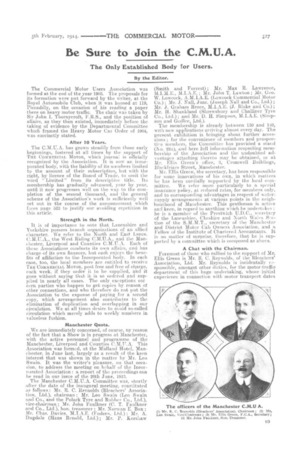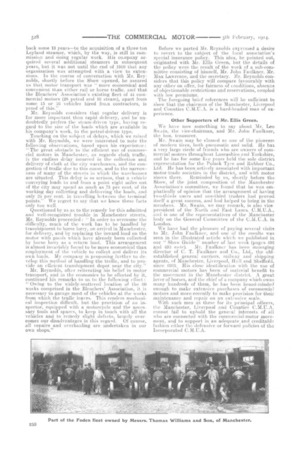Be Sure to Join the C.M.U.A.
Page 27

Page 28

If you've noticed an error in this article please click here to report it so we can fix it.
The Only Established Body for Users.
By the Editor.
The Commercial Motor Users Association was formed at the end of the year 1903. The proposals for its formation were put forward by the writer, at the Royal Automobile Club, when it was housed at 119, Piccadilly, on the occasion of his reading a paper there on heavy motor traffic. The chair was taken by Sir John I. Thornycroft, F.R.S., and the position of affairs, as they then existed, immediately before the taking of evidence by the Departmental Committee which framed the Heavy Motor Car Order of 1904, was succinctly stated.
After 10 Years.
The C.M.U.A. has grown steadily from those early beginnings, fostered at all times by the support of THE COMMERCIAL MOTOR, which journal is officially recognized by the Association, It is POW an incorporated body, with the liability of its members limited to the amount of their subscription, but with the right, by licence of the Board of Trade, to omit the word "Limited" from its descriptive title. its membership has gradually advanced, year by year, until it now progresses well on thm way to the completion of the second thousand, and the general scheme of the Association's work i5 sufficiently well set out in the course of the announcement .which faces page 523 to justify our avoiding repetition in this article.
Strength in the North.
It is of importance to note that Lancashire and Yorkshire possess blanch organizations of an .allied character. We refer to the North and East Lancs. C.M.U.A., the West Riding C.M.U.A., and the Manchester, Liverpool and Counties C.M.U.A. Each of these Associations conducts its own affairs, and has charge of its own -finances, but each enjoys the benefits of affiliation to the Incorporated body. In each case, too, the local members are entitled to receive THE COMMERCIAL MOTOR, post free and free of thArge, each week, if they order it to be supplied, and it goes without saying that it is soordered and supplied in nearly all cases. The only exceptions cor cern parties who happen to get copies by reason or other connections, and who therefore do not put the Association to the expense of paying for a second copy, which arrangement also contributes to the elimination of duplication and overlapping in our circulation. We at all times desire to avoid so-called circulation .which merely adds to weekly numbers in valueless fashion.
Manchester Quota.
We are immediately concerned, of course, by reason of the fact that a Show is in progress at Manchester, with the active personnel and programme of the Manchester, Liverpool and Counties C.M.U.A. This Association was formed, at the Midland Hotel, Manchester, in June last, largely as a result of the. keen interest. that was shown in the matter by Mr. Leo Swain. It was the writer's pleasure, on that occasion, to address the meeting on behalf of the Incor prated Association : a report of the, proceedings can be read in our issue of the 26th June, 1913.
The Manchester C.M.U.A. Committee was, shortly after the date of the inaugural meeting, constituted as follows : Mr. R. C. Reynolds (Bleachers' Association, Ltd.), chairman ; Mr. Leo Swain (Leo Swain and Co., and the Polack Tyre and Rubber Co., Ltd.), vine-chairman; Mr. John Faulkner (C. T. Faulkner and Co., Ltd.), hon. treasurer: Mr. Norman E. Box ; Mr. Chas. Davies, M.I.A.E. (Fodens, Ltd.): Mr. A. Dugdale (Hans Renold, Ltd.); Mr. P. Kershaw (Smith and Forrest); Mr. Max R. Lawrence, M.I.A.E. ; Mr. John T. Lawton ; Mr. Geo. W. Lownoek, A.M.I.A.E. (Lowcoek Commercial Motor Co.); Mr. J. Nall, Junr. (Joseph Nall and Co., Ltd.); Mr. J. Graham Reece, M.I.A.E. (j. Blake and Co.); Mr. II. Shankland (Shrewsbury and Challiner Tyre Co., Ltd.); and Mr. D. H. Simpson, M.I.A.E. (Simpson and Goillee, Ltd.).
The membership is already between 130 and 140, with new applications arriving almost every day. The present exhibition is .bringing about further accessions ; for the convenience of members and prospective members, the Committee. has provided a stand (No. 224), and here full information respecting _membetsh.ip of the Association and the undoubted advantages attaching thereto may he obtained, or at Mr. Ellis Green's -office, 3, Cromwell Buildings, Blackfriars Street, Manchester.
Mr. Ellis Green, the secretary, has been responsible for some innovations of his own, in which matters he has been cordially supported by the local com
mittee. We refer more particularly to a special insurance policy, at reduced rates, for members only, and to corresponding advantages in respect of water! supply arrangements at various points in the neighbouthood of Manchester. This gentleman is active and keen, in regard to anything which he undertakes ; he is a member of the Prestwich U.D.C., secretary of the Lancashire, Cheshire and North Wales Section of the S.M.M.T., secretary of the Manchester and District Motor Cab Owners Association, and a Fellow of the Institute of Chartered Accountants. It is no matter of surprise, therefore, that he is supported by a. committee which is composed as above.
A Chat with the Chairman.
Foremost of those who rallied to the support of Mr. Ellis Green is Mr. R. C. Reynolds, of the Bleachers' Association, Ltd. Mr. Reynolds is incidentally responsible., amongst other duties, for the motor-traffio department of this huge undertaking, whose initial experience in connection with motor transport dates back some 13 years—to the acquisition of a three-ton Leyland steamer, which, by the way, is still in commission and doing regular work. His company acquired several additional steamers in subsequent years, but it was not until the end of 1910 that any organization was attempted with a view to extensions. In the course of conversation with Mr. Reynolds, shortly before the Show opened, he assured us that motor transport was " more economical and convenient than either rail or horse traffic, and that the Bleachers' Association's existing fleet of 44 cornmemial motors (28 petrol and 16 steam), apart from some n or l6 vehicles hired from contractors, is proof of this."
Mr. Reynolds considers thatregular delivery is far more importantthan rapid delivery, and he undoubtedly prefers the steam--driven type, having regard to the size of the loads which are available in his company's work, to the petrol-driven type.
Touching on the subject of delays, which we raised with Mr. Reynolds, we were interested to note the folloNking observations, based upon his experience : " The great obstacle to the efficient us-e -of commercial motors in Manchester, as regards cloth traffic, is the endless delay incurred in the collection and delivery of cloth at the city warehouses, and the congestion of traffic due to this cause, and to the narrowness of many of the streets in which the warehouses are situated. This delay is so serious, that a vehicle convoying loads to and from a point eight miles out of the city may spend as much as 75 per cent. of its working day collecting and delivering the loads, and only 25 per cent. in travelling between the terminal points." We regret to say that we know these facts only too well.
Questioned by us as to the remedy kir this admitted and well-recognized trouble in Manchester streets, Mr. Reynolds pro-ceedcd : " In order to overcome the difficulty, much of the work has to be handled by transhipment to horse lorry, on arrival in Manchester, for delivery, and by replacing the inward load on the motor with goods which have already been collected by horse lorry as a return load. This arrangement is almost. invariably found to be more economical than employment of the vehicle to collect and deliver its own loads. My company is proposing further to develop this method of handling the traffic, and to provide an efficient transhipment depot near the city."
Mr. Reynolds, after reiterating his belief in motor transport, and in the economies to be effected by it, continued his remarks to us to thefollowing effect : " Owing to the widely-scattered location of the 60 works comprised in the Bleachers' Association, itis necessary to garage most of the vehicles at the works from which the traffic leaves. This renders mechanical inspection difficult, but the provision of an inspector, equipped with a motorcycle .and the necessary tools and spares, to keep in touch with all the vehicles and to remedy slight defects, largely overcomes our disadvantages in this regard. Of course, all repairs and overhauling are undertake-n in our own shops." Before we parted Mr. Reynolds expressed a desire to revert to the subject of the local association's special insurance policy. This idea, he pointed out, originated with Mr. Ellis Green, but the details of the policy were the result of the work of a sub-committee consisting of himself, Mr. John Faulkner, Mr. Max Lawrence, and the secretary. Mr. Reynolds considers that this. policy will compare favourably with any other on offer, for fairnessof conditions, absen-ca of objectionable restrictions and reservations, coupled with low premiums.
The foregoing brief references will be sufficient to show that the chairman of the Manchester, Liverpool and Counties C.M.U.A. is a hard-headed man of experience.
Other Supporters of Mr. Ellis Green.
We have now something to say about Mr.. Leo Swain, the vice-chairman, and Mr. John Faulkner, the hon. treasurer.
Mr. Swain may he classed as one of the pioneers of modern tires, both pneumatic and solid. He hat a very largecircle of friends who are owners of commercial motors throughout Lancashire and Yorkshire, and he has for some five. years held the sole district representation for thePolack Tyre and Rubber Co., Ltd. He has been actively associated with important motor-trade societies in the district, and with motor
shows there. Reminded by us, shortly before the, Show, of the joint composition of the Manchester Association's committee, we found that he was emphatic-ally of opinion that the arrangement of having two-thiids users and one-third traders had proved itself a great success, arid had helped to bring in the members. Mr. Swain, we may remark, is also vicepresident of the North and East Lancs. C.M.U.A., and is one of the representatives of the Manchester body on the General Committee of the C.M.U.A. in London.
We have had the pleasure of paying several visits to Mr. John Faulkner, .and one of the re-suits was seen in the illustrated article whir,th we published in our " Show Guide " number of last week (pages 492 and 493 ant-c). Mr. Faulkner has be-en managing director of C. T. Faulkner and Co., Ltd., the oldestablished general carriers, railway and shipping agents, -of Manchester, Liverpool, Hirll and Sheffield,since 1903. His close identification with the use of commercial motors h-as been of material benefit to the movement in the Manchester district, A great lover of horses, and the -chief of a company which owns many hundreds of them, he has been broad-minded enough to make -extensive purchases of commercial motors and more-recently to make provision for their maintenance and repair on an extensive scale, With such m-en .as these for its principal officers, the Manchester, Liverpc4I and Counties C.M.U.A. cannot fail to uphold the general interests of all who are connected with the commercial-motor movement, and to support in an adequate and creditable fashion either the defensive or forward policies of the Incorporated C.M.I.T.A.


































